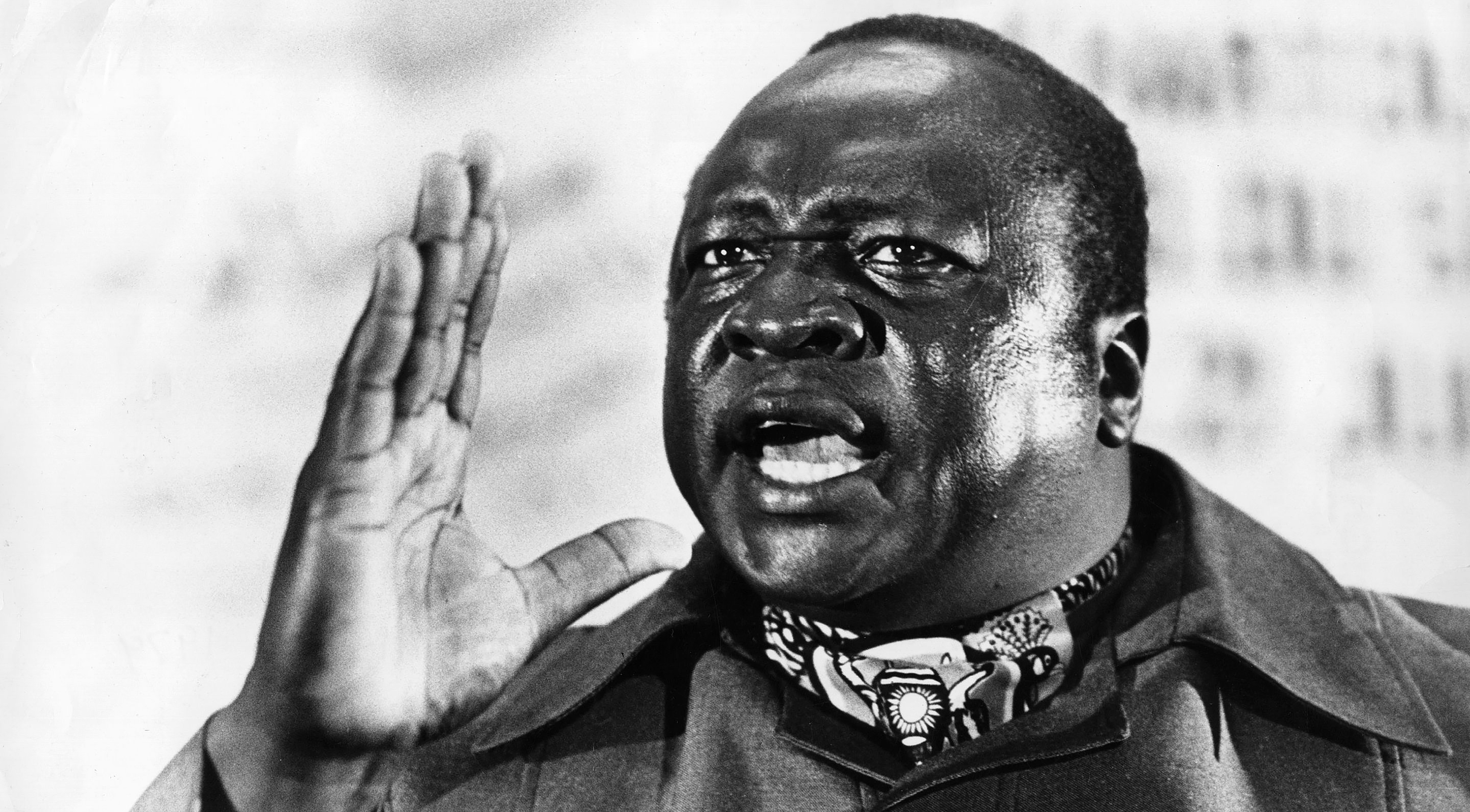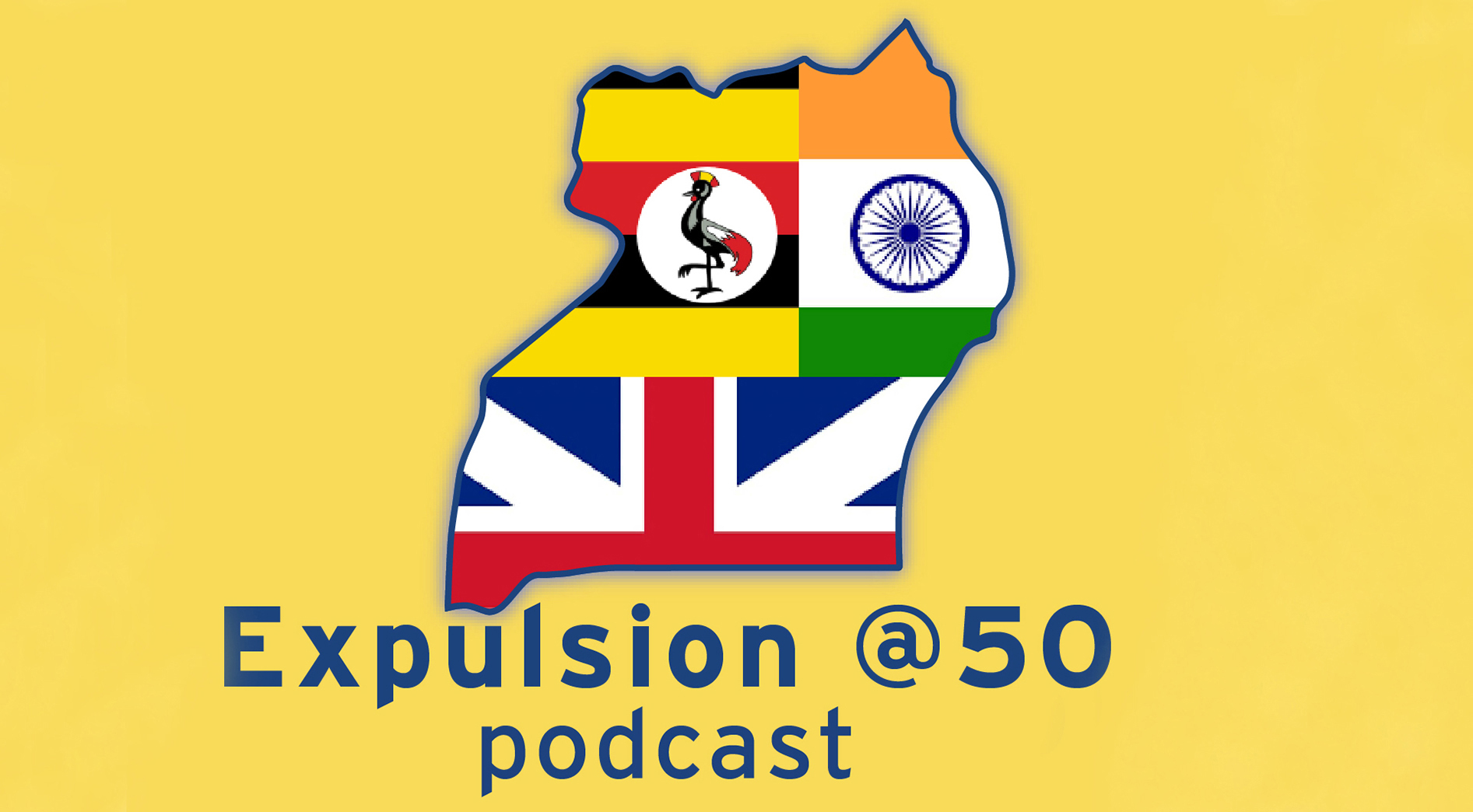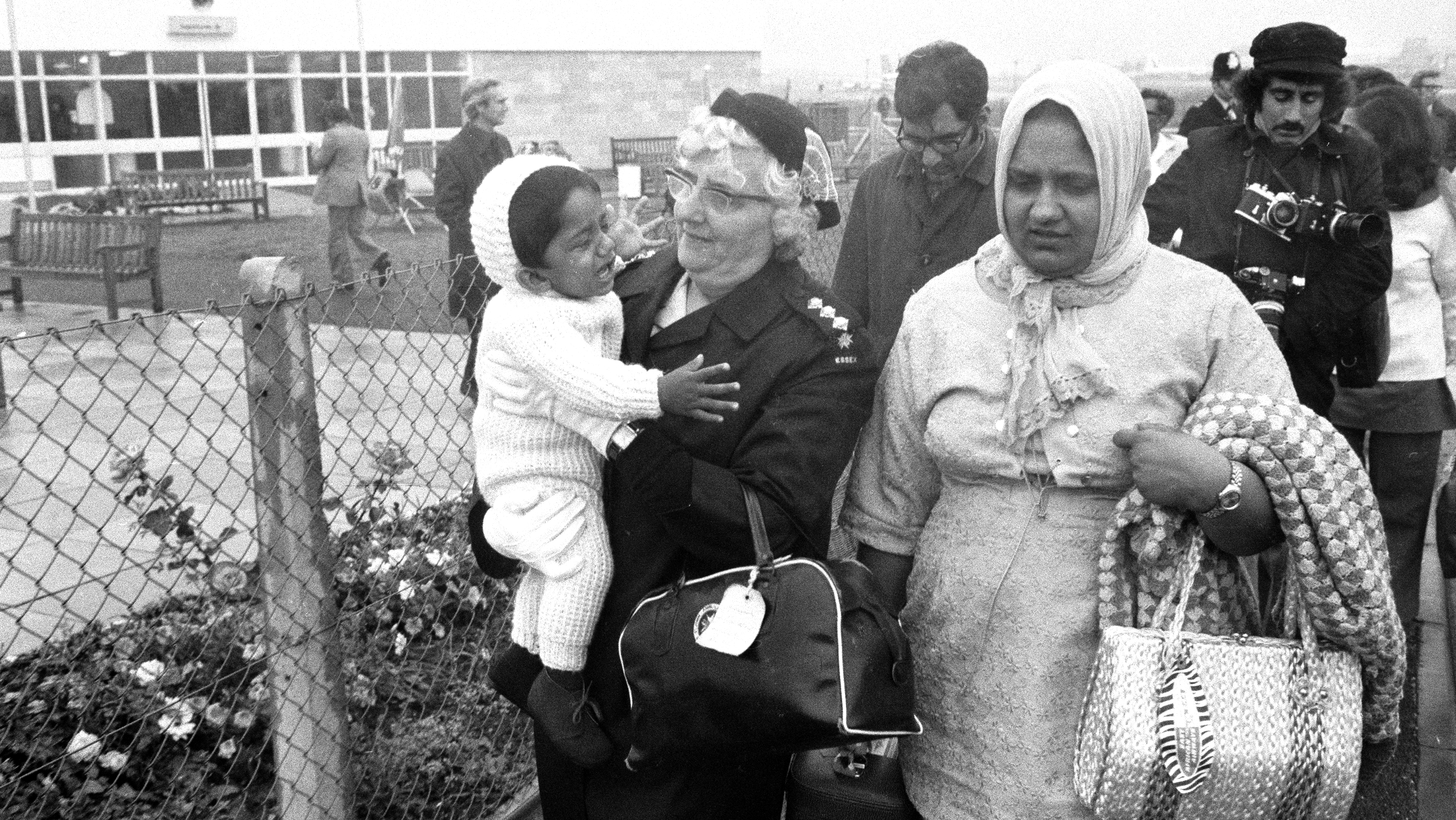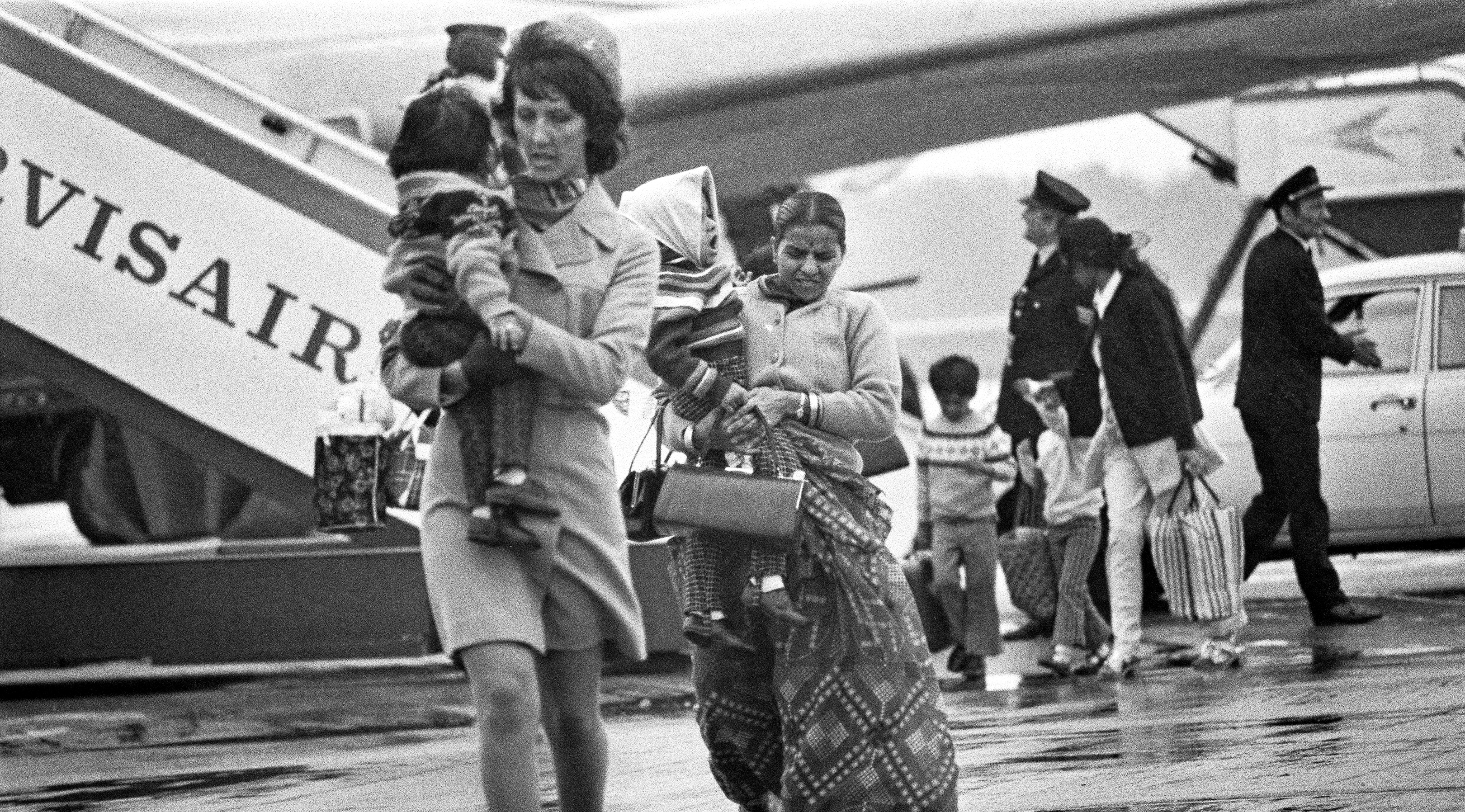Once upon a time, a child called Idi Amin was born. At a young age, he joined the British colonial army, where he was known for his ambition, courage and cruelty. In January 1971, Amin staged a military coup and became the President of Uganda. His rule was brutal, earning the title, “the Butcher of Uganda”.
In August 1972, he expelled 80,000 Asians, people who had played a major role in the economy, giving them 90 days to leave.
 President of Uganda Idi Amin seized power after a coup in January 1971 and was driven from Uganda by Tanzanian forces in 1979. (Photo: Keystone / Getty Images)
President of Uganda Idi Amin seized power after a coup in January 1971 and was driven from Uganda by Tanzanian forces in 1979. (Photo: Keystone / Getty Images)
 (Image: Supplied)
(Image: Supplied)
Expulsion@50 is a podcast I created to raise awareness of this historical event. Twenty-four episodes later, many themes and learnings have emerged.
Podcast guests came from many countries. Some started as icebergs, but soon melted; others were sometimes difficult to contain. People in their 70s shared joyful memories of climbing mango trees or making kites. Just as foods and smells evoke memories, the songs selected by the guests represent an emotional connection to their life back in Uganda.
The initial people whose voices I wanted to capture were people who had been expelled, but soon this expanded and diverse perspectives emerged. Other guests included academics and historians, and those who had written fiction or memoirs. The voices of the second generation and the listeners’ perspectives were also captured.
Background to the Indians in Uganda and East Africa
The British Empire was sustained by extracting raw materials from the colonies. Following the abolition of slavery, Britain introduced indentured labour, when more than two million Indians were contracted and shipped across the Empire to work on plantations and to build railways. One example was the Kenya-Uganda line, used for transporting tea, coffee, cotton and sugar to the coast. Other Indians came independently to East Africa in search of a better life.
Guests spoke about grandparents arriving in Uganda from 1910 onwards. Males as young as 14 were put on boats and received by relatives in Mombasa, who provided work opportunities. The new arrivals learnt Swahili and brought with them an ethos of hard work, enterprise and ambition. Once established, other family members joined. Men returned to India to find a wife and came back married.
Professionals were also recruited from India to sustain the civil service and ensure a functioning government. The British created the “sandwich”: Europeans (top), Indians (middle) and Africans (bottom). This showed itself in the town planning, where the hills of Kampala boasted freestanding houses occupied by the whites, and the blacks lived in the townships outside the city.
The Indians lived in the city centre, making them very visible, while the whites were hidden in the tree-lined suburbs. Black workers travelled into the city at sunrise and returned home at sunset, becoming invisible. Prior to independence in 1962, this de facto apartheid was repeated across the colonies.
Community schools were established for Indians, with teachers from India, the UK and the US. Within the civil service, jobs were reserved according to race and pay scales followed racial lines. Collectively, these policies, implemented over decades, sowed the seeds of inequality and resentment which African leaders sought to address post-independence.
Life in Uganda was carefree prior to 1971. We played in the streets without fear. During school holidays, we visited relatives in neighbouring countries or travelled to India and Pakistan, experiences cherished to this day. Education was the highest priority of parents. Children were expected to pursue higher education.
The “sandwich” contributed to separate living within society. Nonetheless, guests spoke positively about relationships between Indian and African children at school; or with employees working in family businesses. Outside these formal spaces and interactions, there was no social contact. Raju Bhatt in episode 5 reflects, “Only after experiencing racism in England did I question our past with introspection.” Within the Indian community, mixing happened with ease.
In episode 21, the author, Jameela Siddiqi reflects: “…our neighbours were Hindus, Sikhs, Christians, Muslims… we exchanged foods, learnt each other’s languages, and celebrated every festival”. While there was mutual respect for different religions, marriage remained along community, caste, and faith lines. Indian women worked in family businesses and managed the household.
Sumanben Sanghvi, now 88 years old, in episode 15 said, “I went to work every day… life was easy because we had staff to help”. Guests spoke about active social lives, with weekends filled with excursions — picnics, swimming, the drive-in cinema or theatre.
August 1972: the expulsion
 Ugandan Asian refugees arriving at Stansted Airport in Essex, 18 September 1972. They were some of the 27,000 Ugandan Asians to arrive in Britain after their expulsion by Ugandan dictator Idi Amin. (Photo: Robert Powell / Daily Express / Hulton Archive / Getty Images)
Ugandan Asian refugees arriving at Stansted Airport in Essex, 18 September 1972. They were some of the 27,000 Ugandan Asians to arrive in Britain after their expulsion by Ugandan dictator Idi Amin. (Photo: Robert Powell / Daily Express / Hulton Archive / Getty Images)
Everything changed in August 1972. In episode 19, Amir Majothi, now living in Yorkshire, recalls, “President Amin came on the radio and said we had 90 days to leave. We thought it was a hoax.” Amin spoke about following his dream and being commanded by God. Similarly, in episode 1, Zain Lalani, who ended up in Canada, recalls, “My father said, ‘this is not about us. We’re Ugandan citizens; we don’t need to worry’ ”. The army was in charge; the erratic behaviour of soldiers compounded our fears.
Jaswant Jutley, who was 16 years old, recalls in episode 20, “Many had a gun in one hand and Uganda Waragi (vodka) bottle in another.” Indian homes were easy pickings, with many incidents of looting at gunpoint. Prior to our leaving, we gave away our possessions. In episode 15, Sumanben explained, “We had five vans and each driver got one. It was a way of helping them to start on their own.”
Asians’ bank accounts and assets were frozen by the government; the luggage allowance on planes was 20kg and £50.00 in cash. Gold jewellery was one way to take money out of the country. This became a liability as women were strip-searched, beaten, raped by soldiers at roadblocks and at the airport. Discipline and the rule of law were replaced by chaos and anarchy. Many guests described their relief when their planes left Ugandan airspace.
Out of Africa
Where one ended up depended on one’s identity document. The initial announcement referred to those with British passports. However, this had different meanings. Passports had to be verified and a whole slew of new regulations emerged.
Gender discrimination was practised openly; only a father with a British passport could have his dependents travel with him to Britain. Changes to the immigration laws in the 1960s saw the tightening of rules for UK passport holders living in the former colonies. However, white people could travel freely to Britain, even if they were not born there. People queued for days outside the British High Commission and other embassies to get their permits. Indians holding Ugandan passports also had to get their passports verified; many had their citizenship revoked and became stateless.
As Sara Cosemans, an academic in Belgium, highlighted in episode 6, “The British government made the Ugandan Asians a problem for the international community, asking different countries to take them as refugees.”
Under the auspices of the United Nations, almost 6,000 people were issued travel documents and flown out to transit camps in Europe, ending up in Austria, Australia, the Netherlands, Sweden, Switzerland and the US, among others. There are many stories of basic human decency on both sides. While some Ugandans were overjoyed to “get our country back”, the reality was nuanced.
It was hard saying goodbye to staff who had been so loyal. My parents, like many others, had invested everything in Uganda. This was our home. We never wanted to leave. Amin’s presidency was also marked by violence towards his enemies. As Derek Peterson from the University of Michigan explained in episode 22, “we must acknowledge the suffering experienced by the Langi and Acholi tribes”.
In some ways, the 80,000 Asians were lucky to escape; half a million Africans were impoverished or tortured and killed, as Samuel Kalibala, now living in the US, recalls in episode 13, “Poverty descended upon us. Sugar and salt became scarce and expensive. Inflation was rampant”.
Experiences of exile
The Ugandan Asians are regarded as one of the most “successful” immigrant groups. What has contributed to this?
Being in camps was challenging — dormitories, bland food and cold weather. However, people felt safe, with “everyone being in the same boat”. Volunteers helped navigate the system. Houses, jobs and schools were found. “My mother, aged 17, got a job in a bank as soon as she arrived in Ottawa,” said Shezan Muhammedi in episode 12. Once out of the camps, people experienced racism, poor housing and poverty. Guests spoke about needing to grow up fast and assume adult responsibilities. In episode 3, Rohit Vyas from the Netherlands recalls, “I became the interpreter for my mother at the hospital.”
 An anti-immigration demonstration in the UK, following the arrival of thousands of Asian citizens expelled from Uganda by President Idi Amin, 26 September 1972. Signs reading ‘Stop Immigration: Enoch is Right’ refer to the notorious 1968 ‘Rivers of Blood’ speech by British MP Enoch Powell. A large banner at the front reads ‘Britain for the British’. (Photo: Evening Standard / Hulton Archive / Getty Images)
An anti-immigration demonstration in the UK, following the arrival of thousands of Asian citizens expelled from Uganda by President Idi Amin, 26 September 1972. Signs reading ‘Stop Immigration: Enoch is Right’ refer to the notorious 1968 ‘Rivers of Blood’ speech by British MP Enoch Powell. A large banner at the front reads ‘Britain for the British’. (Photo: Evening Standard / Hulton Archive / Getty Images)
In countries like England, we learnt new racist terms, like “Paki” and “wog”, and were told to “go back home”. Politicians like Enoch Powell in the UK and some media stoked the fire. We experienced bullying at school while our parents struggled to find suitable employment. Many hated the idea of being on social security and accepted a job because that was the right thing to do. Asian businesses could not access support from the banks as they were not creditworthy. Family members pooled human and financial resources and bought corner shops where everyone mucked in and worked long hours. Children continued their education with the hope of breaking the cycle of poverty.
Perhaps it was our self-reliance, tenacity and entrepreneurship that pulled us through… 50 years on, we must tell these stories while the survivors are still alive. If we don’t tell them ourselves, someone else will, according to their own interpretation. The anniversary is a wonderful opportunity for educating the younger generation to know their history and heritage. DM/MC
Dolar Vasani is an International Development Consultant based in Johannesburg. Her family was expelled from Uganda in 1972 and went to the UK as refugees. She is the creator of Expulsion@50 and can be contacted at expulsion50@gmail.com.
Season 3 kicks off on 14 January 2022 with episode 25: “Life is nothing more than our stories, yours, and mine”.
All episodes are available on www.anchor.fm/expulsion50;
You Tube
[hearken id="daily-maverick/8976"]




 An anti-immigration demonstration in the UK, following the arrival of thousands of Asian citizens expelled from Uganda by President Idi Amin, 26 September 1972. Signs reading ‘Stop Immigration: Enoch is Right’ refer to the notorious 1968 ‘Rivers of Blood’ speech by British MP Enoch Powell. A large banner at the front reads ‘Britain for the British’. (Photo: Evening Standard / Hulton Archive / Getty Images)
An anti-immigration demonstration in the UK, following the arrival of thousands of Asian citizens expelled from Uganda by President Idi Amin, 26 September 1972. Signs reading ‘Stop Immigration: Enoch is Right’ refer to the notorious 1968 ‘Rivers of Blood’ speech by British MP Enoch Powell. A large banner at the front reads ‘Britain for the British’. (Photo: Evening Standard / Hulton Archive / Getty Images) 